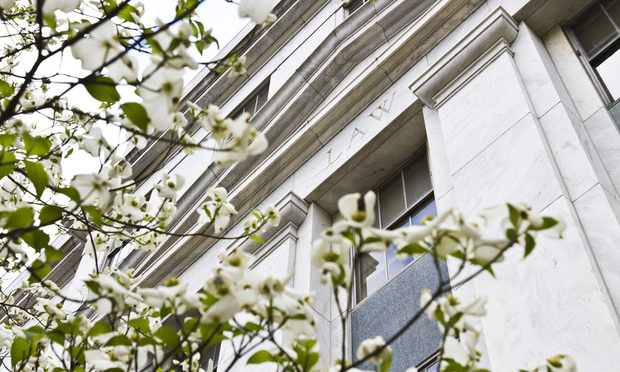Ga. High Court Declines to Revive $30M Hand Verdict
Lawyers on both sides say they'll win the new trial.
November 07, 2018 at 05:26 PM
5 minute read
 Georgia Supreme Court and Court of Appeals Building. (Photo: John Disney/ALM)
Georgia Supreme Court and Court of Appeals Building. (Photo: John Disney/ALM)
The case that led to a $30 million verdict for a horrifically injured hand is headed back for a new trial.
The Georgia Supreme Court has declined to review a Georgia Court of Appeals ruling reversing the verdict. The high court denied the petition for certiorari Monday. All the justices concurred, except Justice Charlie Bethel, who was disqualified. Bethel was on the Court of Appeals panel that scrapped the verdict.
“Because the trial court erred in failing to instruct the jury on a substantial and vital issue presented by the pleadings and the evidence—the defendant's theory that his alleged negligence per se was unknowing and unintentional—we must reverse and remand for a new trial,” Presiding Judge Christopher McFadden wrote in March for a panel that included Judge Elizabeth Branch and then-Court of Appeals Judge Bethel.
“It is the duty of the trial court, whether requested or not, to give the jury appropriate instructions on every substantial and vital issue presented by the evidence, and on every theory of the case,” McFadden said. “Once a plaintiff establishes a prima facie case of negligence per se, the 'burden then shifts to the defendant to show that the violation was unintentional and in the exercise of ordinary care.'”
What became known as the $30 million hand verdict was delivered for injuries to a woman's hand and arm during a trial before Fulton County State Court Judge Eric Richardson in 2016.
The injury was caused by a crash that happened in 2012 when Abdulmohsen Almassud and Luisa Cruz Mezquital approached each other driving in opposite directions on a road in Forsyth County. Almassud's Jeep crossed the center line and crashed into Mezquital's car. Mezquital sustained severe injuries to her hand in the collision. When she sued, she alleged that the Jeep was unsafe. He claimed the steering failed and blamed Oh's Auto Center for a faulty repair. “We are pleased that the Court of Appeals' decision remains intact and believe that a new trial—a fair trial—will yield a much different result,” said the winning appellate lawyer, Laurie Webb Daniel of Holland & Knight.
In oral arguments, Daniel, chair of Holland & Knight's national appellate team and leader of the firm's Atlanta litigation practice, told the court she wouldn't belabor the sheer amount of the verdict—although she did mention it was “many, many times” in excess of judgments in comparable cases.
Instead she focused on Richardson's instructions to the jury.
The judge, Daniel said, declined to include in the jury charge the sole defense raised by her client: that he lost control of his Jeep because of a mechanical defect in the steering. He had recently modified the Jeep for off-road use.
The lawyer who won the $30 million verdict, Ben Brodhead of Brodhead Law, said Wednesday he will ask the Supreme Court to reconsider, “despite the long odds,” because the intermediate appellate court has established precedent in direct conflict with Georgia law.
“The Court of Appeals eliminated negligence per se in Georgia by allowing a defense to anyone who merely claims that an unknown vehicle defect caused a crash. This has never been the law of Georgia and would not be approved by the Supreme Court,” Brodhead said. “This case also places unworkable burdens on trial courts to glean potential defenses from the record even when the defense fails to ask for jury charges on those defenses. Without correction by the Supreme Court, this case will destabilize the trial process, overburden trial courts, and provide appellate courts with the ability to overturn cases on an ad hoc basis.”
Brodhead said the original trial had no error, and the Court of Appeals changed the law in order to reverse.
“Ultimately, appellate courts have the power to change the law, but it complicates the pursuit of justice when the law is a moving target,” he said.
Besides legal precedent, Brodhead lamented the impact of the appeal on his client.
“From a human cost standpoint, Ms. Cruz was devastated and disheartened that her fight for justice will be prolonged for several more years,” Brodhead. “Although a retrial will result in a verdict equal to or greater than the $30 million already awarded, the delay and emotional toll on Ms. Cruz is difficult and troubling for her. This is a case with unbelievably horrific injuries that were inflicted upon Ms. Cruz without any fault at all on her part.”
Time will tell which lawyer is right about what will happen with a retrial. But Brodhead has a photo of the injured hand—too graphic to publish—that offers an explanation of how the first jury came to the $30 million figure. He didn't show it in front of the jurors, but he submitted it into evidence in a sealed envelope so they could choose to look at it.
“You wouldn't go through that for $30 million,” Brodhead said. “Or $50 million.”
The case is Almassud v. Mezquital, No. S18C1127 at the Supreme Court, and No. A17A2119 at the Court of Appeals.
This content has been archived. It is available through our partners, LexisNexis® and Bloomberg Law.
To view this content, please continue to their sites.
Not a Lexis Subscriber?
Subscribe Now
Not a Bloomberg Law Subscriber?
Subscribe Now
NOT FOR REPRINT
© 2025 ALM Global, LLC, All Rights Reserved. Request academic re-use from www.copyright.com. All other uses, submit a request to [email protected]. For more information visit Asset & Logo Licensing.
You Might Like
View All
On The Move: Energy Infrastructure Pro Joins Moore & Van Allen, Adams & Reese Changes Atlanta Leadership
6 minute read
40% Contingency: A New Ruling Just Cost This Plaintiff Team $827K in Legal Fees
6 minute read

'David and Goliath' Dispute Between Software Developers Ends in $24M Settlement
Trending Stories
- 1'It's Not Going to Be Pretty': PayPal, Capital One Face Novel Class Actions Over 'Poaching' Commissions Owed Influencers
- 211th Circuit Rejects Trump's Emergency Request as DOJ Prepares to Release Special Counsel's Final Report
- 3Supreme Court Takes Up Challenge to ACA Task Force
- 4'Tragedy of Unspeakable Proportions:' Could Edison, DWP, Face Lawsuits Over LA Wildfires?
- 5Meta Pulls Plug on DEI Programs
Who Got The Work
Michael G. Bongiorno, Andrew Scott Dulberg and Elizabeth E. Driscoll from Wilmer Cutler Pickering Hale and Dorr have stepped in to represent Symbotic Inc., an A.I.-enabled technology platform that focuses on increasing supply chain efficiency, and other defendants in a pending shareholder derivative lawsuit. The case, filed Oct. 2 in Massachusetts District Court by the Brown Law Firm on behalf of Stephen Austen, accuses certain officers and directors of misleading investors in regard to Symbotic's potential for margin growth by failing to disclose that the company was not equipped to timely deploy its systems or manage expenses through project delays. The case, assigned to U.S. District Judge Nathaniel M. Gorton, is 1:24-cv-12522, Austen v. Cohen et al.
Who Got The Work
Edmund Polubinski and Marie Killmond of Davis Polk & Wardwell have entered appearances for data platform software development company MongoDB and other defendants in a pending shareholder derivative lawsuit. The action, filed Oct. 7 in New York Southern District Court by the Brown Law Firm, accuses the company's directors and/or officers of falsely expressing confidence in the company’s restructuring of its sales incentive plan and downplaying the severity of decreases in its upfront commitments. The case is 1:24-cv-07594, Roy v. Ittycheria et al.
Who Got The Work
Amy O. Bruchs and Kurt F. Ellison of Michael Best & Friedrich have entered appearances for Epic Systems Corp. in a pending employment discrimination lawsuit. The suit was filed Sept. 7 in Wisconsin Western District Court by Levine Eisberner LLC and Siri & Glimstad on behalf of a project manager who claims that he was wrongfully terminated after applying for a religious exemption to the defendant's COVID-19 vaccine mandate. The case, assigned to U.S. Magistrate Judge Anita Marie Boor, is 3:24-cv-00630, Secker, Nathan v. Epic Systems Corporation.
Who Got The Work
David X. Sullivan, Thomas J. Finn and Gregory A. Hall from McCarter & English have entered appearances for Sunrun Installation Services in a pending civil rights lawsuit. The complaint was filed Sept. 4 in Connecticut District Court by attorney Robert M. Berke on behalf of former employee George Edward Steins, who was arrested and charged with employing an unregistered home improvement salesperson. The complaint alleges that had Sunrun informed the Connecticut Department of Consumer Protection that the plaintiff's employment had ended in 2017 and that he no longer held Sunrun's home improvement contractor license, he would not have been hit with charges, which were dismissed in May 2024. The case, assigned to U.S. District Judge Jeffrey A. Meyer, is 3:24-cv-01423, Steins v. Sunrun, Inc. et al.
Who Got The Work
Greenberg Traurig shareholder Joshua L. Raskin has entered an appearance for boohoo.com UK Ltd. in a pending patent infringement lawsuit. The suit, filed Sept. 3 in Texas Eastern District Court by Rozier Hardt McDonough on behalf of Alto Dynamics, asserts five patents related to an online shopping platform. The case, assigned to U.S. District Judge Rodney Gilstrap, is 2:24-cv-00719, Alto Dynamics, LLC v. boohoo.com UK Limited.
Featured Firms
Law Offices of Gary Martin Hays & Associates, P.C.
(470) 294-1674
Law Offices of Mark E. Salomone
(857) 444-6468
Smith & Hassler
(713) 739-1250






